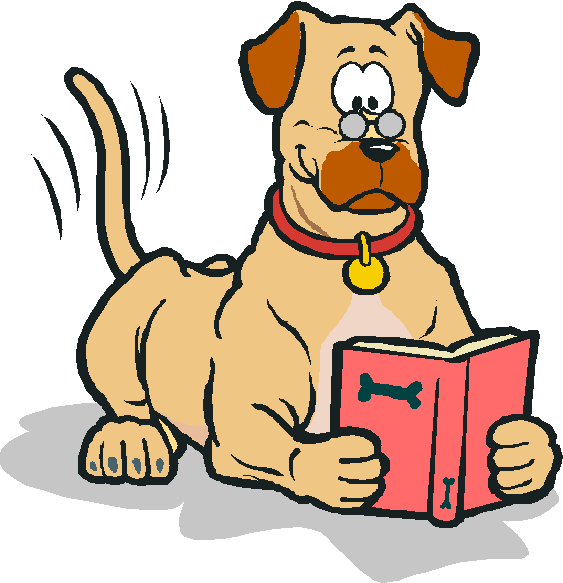
Canine Learning Center, Inc.
The School for Canine Development

How much do you know about raising a puppy?
Take this test and bust the myths! True or False?
|
False! Even older dogs chew. Puppies chew to help with teething. However, chewing also can relieve excess energy and boredom. Dogs will chew through their entire lifetime, but it takes a human to teach the dog what is acceptable to chew (chew toys) and what isn't (your shoes). As a matter of fact, puppies don't grow out of ANY of the behaviors they learn as puppies (biting, chewing, jumping), unless they are taught. |
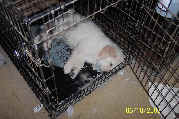 Crate
training is an important skill for puppies.
True or False? Crate
training is an important skill for puppies.
True or False?
True! Crate training is not just for housebreaking. Crate training keeps the dog from chewing things he shouldn't when you can't watch him. Getting a dog used to a crate and confinement also helps him should he ever have to stay at the veterinary clinic. Think of a crate as a playpen or a crib. It keeps your puppy safe when you aren't available to guide him. |
 Socialization
can be done at any age. True or False? Socialization
can be done at any age. True or False?
False! Socialization is one of the most misunderstood terms in dog training. It comes from the name of a critical period in the puppy's development and it ends at 12 weeks of age! (Scott and Fuller, 1965) The next critical period is the Juvenile Period and is actually just as important. It is the time (until approximately six months of age) that the puppy is developing his personality and habits of behavior. It is the easiest time to train, to teach our rules and to mold his personality. It is the optimum time to carefully introduce him to new experiences. Dogs that show fear or aggression after this critical period will not benefit from a flood of social experiences. As a matter of fact, quite the opposite can happen - it can actually do more harm than good as the dog is forced to cope with a situation he is not equipped to handle. Once a dog has developed fear or aggression issues, a behavior specialist is required to help the dog through a solid desensitization program. |
|
False. Though at one time, it was true. Years ago, when training was still about hard corrections, it was recommended that we delay training until the puppies were at least six months of age. However, thanks to Scott and Fuller, Clarence Pfaffenberger and others that studied optimum learning stages in dogs, we now know know how important it is to begin early and we have softer, gentler techniques to train puppies. As a matter of fact, top competition trainers start puppy training as soon as the pup comes home (at 8-10 weeks), they simply do it at a level the puppy can handle. Puppy classes are designed to address the short attention spans, clumsy motor coordination and moldable temperaments of young puppies. A good puppy class helps the owner teach social skills (no jumping or biting) and properly introduces them to new experiences. Puppy classes can make your job as the puppy's owner a whole lot easier! |
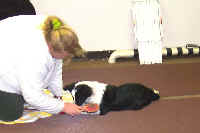
Puppy classes are for more than just solving problems. True or False? True. If you answered this one correctly, you have been paying attention. Good for you! Puppy classes get your dog under a trained eye and help you stop problems before they begin! |
To find a good trainer in your area, ask your veterinarian or go to www.apdt.com
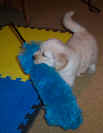 Puppies
grow out of the chewing stage. True or False?
Puppies
grow out of the chewing stage. True or False?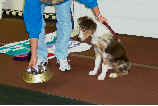 You
should not start training classes until your puppy is 6
months old. True
or False?
You
should not start training classes until your puppy is 6
months old. True
or False?